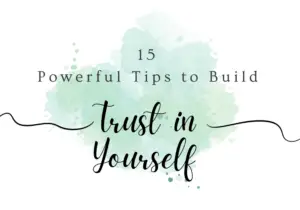What is “Trust in yourself” means:
“Trust in yourself” is essential for cultivating self-reliance, courage, and resilience. It empowers you to take calculated risks, learn from setbacks, and persevere through adversity. It serves as a constant reminder that you possess the capability to achieve your dreams and embrace your individuality. Trust in yourself and Trust in your abilities leads to self-reliance and self-discovery, guiding you toward a fulfilling and purpose-driven existence. By having faith in your instincts and skills, you can unlock your utmost potential, wholeheartedly embrace your uniqueness, make confident decisions, and ultimately create the life you aspire to, fostering personal growth and self-discovery.
Why Don’t You Trust in Yourself?
Low self-trust can manifest as self-doubt, imposter syndrome, indecisiveness, and low self-esteem, potentially leading to missed opportunities in various aspects of life. The absence of self-trust can originate from a multitude of factors and experiences, varying from individual to individual. Here are a few prevalent rationales as to why individuals may exhibit a lack of trust in their abilities:
- Perfectionism.
- Procrastination.
- Anxiety regarding the future.
- Previous failures.
- Negative self-dialogue.
- External criticism.
- Comparisons.
- Lack of self-awareness.
- Fear of failure.
- Imposter Syndrome.
- Trauma.
- External influences.
How to Trust in Yourself?

1-Spend time with yourself:
It is essential to make quality time for yourself. If your schedule is packed and you don’t have any moments of quiet and solitude, your trust in yourself may suffer. Do you go to bed with a mind full of racing thoughts? Thoughts bombarding you from every direction, demanding your attention? If so, it may be time for some much-needed ‘me-time’. There are several effective ways to establish a strong foundation for improved self-trust through your solo time.
2-Being open to taking risks:
Being open to taking risks can help you trust in yourself more. Giving yourself challenges, even if they don’t work out, helps you believe in yourself more. Having difficult conversations when needed, going after the job you want, pushing yourself to meet your fitness goals, and upgrading your skills…etc, are all ways to build trust in yourself. If you embrace the challenges and put effort into them, you’ll grow more confident in yourself.
3-Build on your strengths:
To trust yourself means to have the ability to try different tasks without being too critical of yourself. We all have different strengths and weaknesses where we struggle. It is important to identify your strengths and weaknesses to build self-trust. If you want to cultivate trust in yourself, focus more on activities where you shine and spend less time on ones where you are not as proficient. Most importantly, embrace and accept both your strengths and weaknesses.
4-Be decisive:
To trust yourself, you need to stop constantly doubting your decisions. Instead, when you make a choice, stand by it. Even if it doesn’t turn out to be the best choice, there’s no point in beating yourself up over it. The important thing is to learn from your mistakes and believe that you will make better choices in the future. By doing this, you will develop greater trust in yourself and your ability to make decisions.
Related:Decidophobia: Symptoms, Causes & 16 ways to overcome
5-Don’t Be Afraid Of Vulnerability: :
Vulnerability can enhance your trust and self-confidence.
It may not always be comfortable or enjoyable to be vulnerable. However, vulnerability enables you to be open and honest with others and yourself, expressing your true identity and emotions. Even though vulnerability may involve challenging emotions, it is essential to be sincere and transparent in all aspects of life. Starting with voicing your feelings and needs is an excellent way to cultivate self-trust.
6-Set specific goals:
Set specific goals that are attainable and will help you progress in life and build self-assurance. The most effective way to ensure you will achieve these goals is by setting SMART goals ( specific, measurable, attainable, relevant, and time-bound) – ones that challenge you to aim high while remaining realistic and achievable.
Related:How to Set Goals and Achieve Them? 10 Tips for Success
7-Use the TRUST Model:
The TRUST Model is a useful tool for self-reflection and growth. When you lack trust in yourself, it can be challenging to be honest and supportive. Inspired by Glaser’s work, this model helps build healthy conversations with others and ourselves. To strengthen self-trust, it’s important to be transparent, show respect, understand others, and strive for shared success. These steps will guide you towards a more trusting relationship with yourself.
- Transparency:
Be willing to embrace transparency, by sharing the reasons behind actions and decisions (Tell the “why” behind the “what”). Rather than withholding information, prioritize open communication. Strive to alleviate fears rather than create them.
- Respect:
Recognize the potential and capabilities of others. Assume positive intentions and choose to use respectful language and behavior. - Understand (Stand under):
Empathize with others by truly listening to their reality. Make an effort to understand their perspective and approach situations with an open heart. - Shared success:
Collaborate to create scenarios that benefit all parties involved (Co-create win/win/win scenarios). Develop strategies for mutual success and challenge assumptions. - Tell the truth:
Bridge any gaps between reality and perception by being truthful in your communication. Actively listen to address any misunderstandings and avoid fabricating information.
8-Accept that imperfections are a part of life:
Perfectionism hinders self-trust and progress in the face of mistakes. When a perfectionist makes an inevitable mistake, they often give up and feel like a complete failure. Their unforgiving mindset allows no room for error, leading to self-destructive behavior and fear of failure.
To overcome perfectionism, it is crucial to shift your mindset. Remember that everyone makes mistakes, as it is through these mistakes that personal growth occurs. Even if you make mistakes, you can still love and trust in yourself. Keep pushing forward and dust yourself off.
Related:10 Ways to Overcome Perfectionism
9-Fail forward:
Learn from every mistake and move forward with more knowledge, strength, and confidence. Avoid making generalizations about your behavior while learning. Remember, one mistake does not define all your decisions. Each mistake builds resilience and trust in yourself.
10-Honor your emotions and allow them the space they need:
Honor and acknowledge your emotions by giving yourself the time and space to process them. If you constantly rush through life without taking the time to reflect on your experiences, you may find yourself emotionally and spiritually overwhelmed. It is essential to regularly set aside time to slow down and connect with yourself. Even if you are not typically inclined towards self-analysis, consider trying it out. Start by dedicating an hour or two every week to be alone with your thoughts and feelings. Take note of any lingering emotions that need attention, regardless of whether or not they seem logical. Remember that every emotion within you deserves recognition.
Related:How to Find Emotional Healing?
11-Keeping your commitments:
Keeping your commitments is an important way to boost confidence and trust in yourself. Whether it’s a promise to a loved one, sticking to a desired change in your diet or your daily routine, or taking steps towards your personal, and career goals, honoring commitments builds trust in yourself and others. Additionally, it showcases your dependability, resilience, and integrity, qualities that will benefit you in your future endeavors.
12-Avoid Negativity and Naysayers:
It can be beneficial to reassess who is in your life and how they affect you. Think of individuals in your circle who may not be supportive of your pursuits, undermine your decisions and achievements, or display negativity in any form. It’s okay to distance yourself from these people, even if it means ruffling some feathers. Making this change can give you trust in yourself and bring peace to your life by eliminating negative influences.
If you have trouble saying no or disagreeing with others, this can make it harder to cut off these negative relationships. Imagine how your life would improve without their negativity and doubt. Take small steps to reduce contact and protect your mental space, and eventually, you will succeed in distancing yourself from these negative influences.
Don’t worry about hurting peoples’ feelings as you remove these negative relationships, because sometimes it needs to be done to protect.
13-Expressing your true self is important:
Sometimes, we compromise by saying what others want and letting external factors control us. We keep quiet and avoid sharing our opinions. This self-censorship stops others from truly knowing us. It’s natural to hide certain parts of ourselves due to fear, but we must let go of the false exterior.
Trust in yourself becomes hard when we act two-faced. Being authentic is crucial for self-trust and genuine relationships. The more authentic we are, the better we understand ourselves and others can understand us too. Not everyone has to like us, but being true to ourselves will attract the right people.
14-Enforcing personal boundaries:
If you struggle with trust in yourself, it becomes challenging to assertively decline and stand firm when others cross the line. Personal boundaries set the standards for how others should treat you and how you will respond when those boundaries are violated. By establishing and maintaining these boundaries, you assert your power and ensure that relationships are characterized by respect, support, and care.
15-Gather examples of when your decisions turned out positively:
There’s a chance that in the past, you may have lacked self-trust because you tend to forget the times when your trust in yourself worked out well, and instead focus on the times when it didn’t go as planned. This tendency is known as negativity bias, and it affects all of us to some extent. For example, if 100 people say something nice to you but one person gives you harsh criticism, you tend to dwell on the negative feedback. To counterbalance this bias, create a list of all the instances when you trusted yourself and it turned out to be a resounding success.
In conclusion:
If you work on building trust in yourself and gaining self-confidence, you will place yourself in a position to take advantage of new opportunities and bring a peaceful life with more self-love. Just like building any other skill, it takes focus and effort but the reward is worth it.








